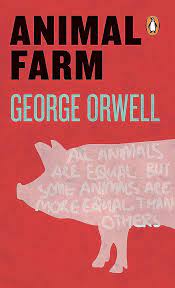Summary Of The Book
There is no turning back once the war trumpet has been the sounded. The animals at Manor Farm have declared war on their drunken and irresponsible owner Mr. Jones, and have secured the farm for themselves after successfully driving out all the humans.
It all began when Old Major, the old prize boar on Manor Farm, had a dream in which animals live in a utopian world without the tyranny of man. Inspired by Old Major’s rhetoric and an old song “Beasts of England”, taught to them by Old Major, the animals revolt against the tyranny of their human masters.
Once the animals take over the farm, they expect things to get better for their kind, and emphatically declare all animals to be equal. Does the utopian dream of Old Major live up to the animals’ expectations or are they in for a dystopian awakening as things take on an altogether different turn? Do Snowball and Napoleon manage to bring order to the chaotic situation following the revolution? Now that the humans have been banished from Manor Farm, what new evil lurks round the corner, waiting to possess the innocent farm animals?
Animal Farm is a straightforward tale of a remarkable revolution in the animal world. However, on a deeper level it is a political satire of the cruel man-made ideologies of class divisions and the subsequent class struggles involved. A radio version of the novella was broadcast on BBC Radio in January 1947. Animal Farm has also been adapted to film twice, as an animated feature in 1954 and later as a TV live action version in 1999. A theatrical version of Animal Farm was staged in London in 1984, followed by a tour of nine cities in 1985. Guy Masterson’s solo version that premiered at the Traverse Theatre Edinburgh in 1995 has been touring the world since.
About George Orwell
George Orwell was the pseudonym used by Eric Arthur Blair. He was an English journalist and novelist, well known for his satirical works on social injustice and totalitarianism. His other well known books include Nineteen Eighty-Four, Homage to Catalonia, The Road to Wigan Pier and Down and Out in Paris and London. Orwell was a strong believer in the democratic state and his major works are all satires on authoritarian rules and the class divide that still plagues the post modern society.
He was born in Motihari, Bihar, in India. He was brought up in Henley-on-Thames, England, where he went to a convent school. He was a King’s Scholar at Eton from May 1917 to December 1921, when he left and subsequently joined the Indian Imperial Police in Burma. Orwell returned to London in 1927 before moving to Paris a year later. Orwell married Eileen O'Shaughnessy and was survived by a son, Richard Orwell, from that marriage. After Eileen’s demise, Orwell married Sonia Brownell shortly before his death. George Orwell was diagnosed with tuberculosis in 1947 and succumbed to the disease in 1950.




Comments (0)